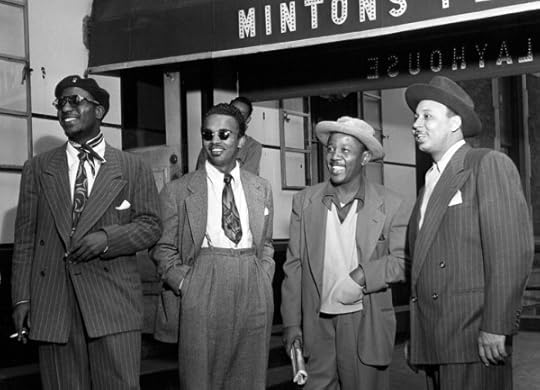Alan Jacobs's Blog, page 215
September 22, 2019
evangelicalism redux
Another topic I’ve written about frequently here — though with less pleasure than I’ve had writing about Ruskin — is what evangelicalism was and is and (perhaps) shall be. I have a new short essay at theatlantic.com that doesn’t add a lot that’s new, but does have the virtue of calling attention to my friend Tommy Kidd’s new book.
about Ruskin
There are many posts about John Ruskin on this blog — click on the relevant tag below — but let me add to that material links to two essays, one by me and one by Gene McCarraher. They’re very different but I think they complement each other.
September 20, 2019
climate hope
At the end of this interview, the environmental historian Jason Moore says, “Capitalism … had its social legitimacy because in one way or another it could promise development. And I don’t think anyone takes that idea seriously anymore.” Which is a very strange thing to say indeed, because economic development is the one promise that capitalism has delivered on, and massively. (This is the chief burden of the books by Deirdre McCloskey that I wrote about here and here.) In fact, and quite obviously, economic development around the world is the chief reason we have a climate crisis, because that development has ravaged our environment — and the global nature of modern capitalism means that that ravaging has been dispersed over the entire globe.
Moore agrees with my friend Wen Stephenson that nothing serious can be done to avert the oncoming climate catastrophe except a world-wide political/economic revolution. Stephenson:
The sheer depth, scale, and speed of the changes required at this point are beyond anything a mere climate movement can possibly accomplish, because such a movement is inherently unsuited to the nature of the task we face: radically transforming the political-economic system that is driving us toward climate breakdown. Given the sclerotic system in which the Green New Deal — the only proposal ever put before Congress that confronts the true scale and urgency of the climate catastrophe — is dead on arrival, mocked even by the Democratic Speaker of the House, the pretense that anything less than revolutionary change is now required amounts to a form of denial.
I am skeptical about this proposal for two reasons:
The revolution would have to be global, because if it happens only in Europe or North America, or both, then global capital will simply shift its attentions and energies to other parts of the world, East and South (which is already where most of the depredations of the environment are happening). But a single, ideologically unified, worldwide political revolution is simply unimaginable.
I see absolutely no reason to believe that any socialist government, local or global, will implement the changes needed to slow climate change. Socialism has a uniformly terrible record in these matters, from the Soviet Union to Chavez’s Venezuela — totally dependent for its social stability on global petrocapitalism — to this little country you may have heard of called China. I strongly suspect that that pattern will continue: when socialist policies throw a spoke into the engine of commerce, and the economy starts to collapse so that there’s less and less wealth to distribute, then socialist governments, like all others, will not hesitate to exploit the environment to become more productive. (Or will become state-capitalists like the Chinese Communist Party.)
Where does that leave us? Well, you can offer a counsel of despair, as Jonathan Franzen does. Now, he says he doesn’t despair:
If your hope for the future depends on a wildly optimistic scenario, what will you do ten years from now, when the scenario becomes unworkable even in theory? Give up on the planet entirely? To borrow from the advice of financial planners, I might suggest a more balanced portfolio of hopes, some of them longer-term, most of them shorter. It’s fine to struggle against the constraints of human nature, hoping to mitigate the worst of what’s to come, but it’s just as important to fight smaller, more local battles that you have some realistic hope of winning. Keep doing the right thing for the planet, yes, but also keep trying to save what you love specifically — a community, an institution, a wild place, a species that’s in trouble — and take heart in your small successes. Any good thing you do now is arguably a hedge against the hotter future, but the really meaningful thing is that it’s good today. As long as you have something to love, you have something to hope for.
But this is frankly to admit that all the victories are short-term and small-scale. Franzen tries not to think about what’s happening in the longer term and on the global scale.
Does anything remain? Possibly: technological fixes. Any potential fixes are fraught with uncertainty and danger, but more and more scientists are quietly hinting that they just may be our last resort. But why are those scientists being so quiet in their hinting? Largely because almost every climate activist I know of is absolutely and unremittingly hostile to any such proposals. Like my suspicions about global socialist revolution, their suspicions about technological fixes come in two varieties. The first is straightforward and reasonable: Why would we trust the very technocracy that got us into this mess to get us out?
The second one, though, is a little more complicated. I think that many climate activists hate the very idea of technological fixes because if they should happen to work that would mean that the bastards got away with it. That is, if the global capitalist elite that has soo cheerfully and brazenly and heedlessly destroyed the natural world should, at the last moment, pull a technological rabbit out of their technocratic hat that stops the worst from occurring, that would feel like the biggest miscarriage of justice ever, because a group of people who have a very strong claim to the title of Greatest Criminals in History would walk away scot-free and indeed might even be thought of as heroes. It offends one’s sense of justice so profoundly that it’s hard to root for such technological fixes to work, even if they could indeed avert the worst consequences of capitalist exploitation of the planet.
But a planet saved is better than a planet ruined. Even if in the saving the Greatest Criminals walk free.
So I am thinking a lot about the various technological means of addressing climate change. I’m looking for actions less dangerous than the great big global fixes that some of the more imaginative technocrats propose, but that also would have, at least potentially, far greater effects than the strictly local actions that Franzen recommends. Ideas in this post seem to come in twos, so here are two very promising ideas:
The first involves making plants a little better at holding carbon dioxide:
Chory believes the key to fixing that imbalance is training plants to suck up just a little more CO2, and to keep it longer. She is working on engineering the world’s crop plants to have bigger, deeper roots made of a natural waxy substance called suberin — found in cork and cantaloupe rinds — which is an incredible carbon-capturer and is resistant to decomposition. By encouraging plants to have bigger, deeper, more suberin-rich roots, Chory can trick them into fighting climate change as they grow. The roots will store CO2, and when farmers harvest their crops in the fall, those deep-buried roots will stay in the soil and keep their carbon sequestered in the dirt, potentially for hundreds of years.
The second would turn air conditioners into carbon-capture machines:
A paper published Tuesday in the Nature Communications proposes a partial remedy: Heating, ventilation and air conditioning (or HVAC) systems move a lot of air. They can replace the entire air volume in an office building five or 10 times an hour. Machines that capture carbon dioxide from the atmosphere — a developing fix for climate change — also depend on moving large volumes of air. So why not save energy by tacking the carbon capture machine onto the air conditioner?
Let a thousand such flowers bloom — a thousand ways to address our changing environment that are technologically feasible and highly scalable but do not require the complete transformation of the whole human order. Keep those ideas coming, scientist friends. We desperately need them.
September 19, 2019
Monk and crew
Malcolm is very happy when he’s wet.

Malcolm is very happy when he’s wet.
September 15, 2019
For what it’s worth, I haven’t read a news story from the...
For what it’s worth, I haven’t read a news story from the New York Times in — five years, maybe? I came to the conclusion long ago that the Times doesn’t care whether the news stories they run are true. They don’t even care whether the stories are by any general measure impoortant. They have an institutional narrative that they want to sell to the world, and they run stories that are useful to that narrative. All the news that fits.
September 10, 2019
consolidation
One of the ongoing themes of my online life is accidental dispersal — I inadvertently accumulate sites of digital presence, and then at a certain point realize that I need to consolidate.
I realized recently that, as much as I enjoy having a blog devoted to soccer called The Pacey Winger, I just don’t post often about soccer to justify a dedicated blog. I also realized that I had created the blog in part because I thought that people who read the kinds of things I post here wouldn’t be interested in soccer — but you know what? Those people don’t have to read my soccer posts. Just pass them by, ain’t no big thing.
So here’s what I’m trying to do now: thoughts (about whatever) go here, and quotes — with, occasionally, a sentence or two of commentary — go on my Pinboard page. And that’s all.
There, I fixed it.
September 6, 2019
confuser
I wrote recently about software that’s hostile to users who lack an ideally functioning sensorium, but software can also be hostile to users who lack an ideal knowledge base. Often I find myself looking through the preferences for an app, with checkboxes or toggle switches, and see next to those options terse descriptions that make no sense to me. I don’t know whether to check the box or not because I don’t know what my choice will do. This happens when the makers of software assume that all of their users will know most of what they know about their software, or at least about that particular category of software.
I could illustrate this point with some examples, but I really don’t want to. Making software is hard — especially for independent developers who have limited staff and limited budgets, and most of the software I own comes from such developers. (All of the software I love comes from such developers.) I have no interest in shaming people who may well be scrambling to debug or update their code and have no leftover time for communicating more clearly with their less-than-perfect users. But if any software developers want to get better at this kind of thing, they could learn a thing or two from Shirt Pocket, the makers of SuperDuper.
SuperDuper — the official name concludes with an exclamation point but I ain’t doing that — is a fantastic tool for backing up your hard drive and making it bootable, so if you ever find that your computer won’t start up you can do so from the backup disk. I’ve owned SuperDuper for fourteen years and have used it countless times for keeping my data safe.
When you’re ready to copy your hard drive, this is what you see:

Notice how the app explains, fully and in plain English that dogs and cats can read, precisely what the app is about to do. Even if you know almost nothing about how computers work, you can figure this out.
Now, SuperDuper does all this because it’s an extremely powerful app — you have just given it permission to do things with all of your data, and making the wrong decision about all your data could be catastrophic — so a developer might say that you don’t need to be this explicit in apps, or preferences within apps, that have far lower stakes.
But why not do it? Why not try to make using your app more comfortable for users who don’t fully understand how your app works? Sure, full descriptions take up more room in your Preferences window, but that’s a soluble design problem. And full descriptions give those users more confidence. They make us think that you’re on our side.
As I said, I don’t want to shame anyone. But I took the time earlier this week to send emails to a couple of developers, explaining how uncertain I am about some of their preferences. “I think checking this box will do X, but I’m not sure — maybe it’ll do Z instead.” They haven’t replied.
I’m very pleased that my eminent colleague Philip Jenkins...
I’m very pleased that my eminent colleague Philip Jenkins is working on a book about the relationship between fertility rates and religious belief — two things that are closely connected but in ways we don’t yet fully understand.
September 5, 2019
monosyllabic
At the excellent Futility Closet I learn of a nineteenth-century fellow who wrote a sermon entirely in words of one syllable:
He who wrote the Psalm in which our text is found, had great cause to both bless and praise God; for he had been brought from a low state to be a great king in a great land; had been made wise to rule the land in the fear and truth of God; and all his foes were, at the time he wrote, at peace with him. Though he had been poor, he was now rich in this world’s goods; though his youth had been spent in the care of sheep, he now wore a crown; and though it had been his lot for a long time to hear the din of war and strife, peace now dwelt round the throne, and the land had rest.
That’s quite good, is it not? See also William Barnes’s book of speech-craft.
And: this stanza from one of the greatest of Auden’s poems, “The Shield of Achilles”:
The mass and majesty of this world, all
That carries weight and always weighs the same
Lay in the hands of others; they were small
And could not hope for help and no help came:
What their foes like to do was done, their shame
Was all the worst could wish; they lost their pride
And died as men before their bodies died.
Sixty-three words: one of three syllables, four of two syllables, all the others of one syllable each (including thirty-seven of them in a row). The words trudge at the pace of a terrible dirge.
Alan Jacobs's Blog
- Alan Jacobs's profile
- 533 followers




